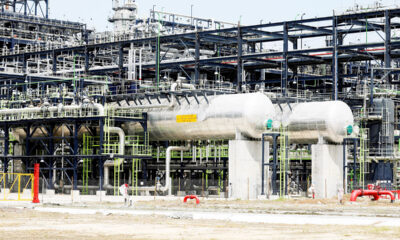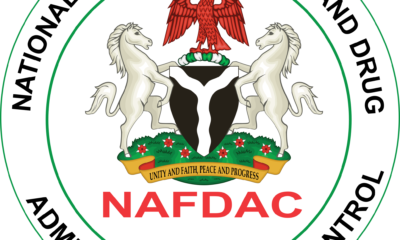Energy
Fuel scarcity, price hike looms as Dangote Refinery, PENGASSAN face-off deepens
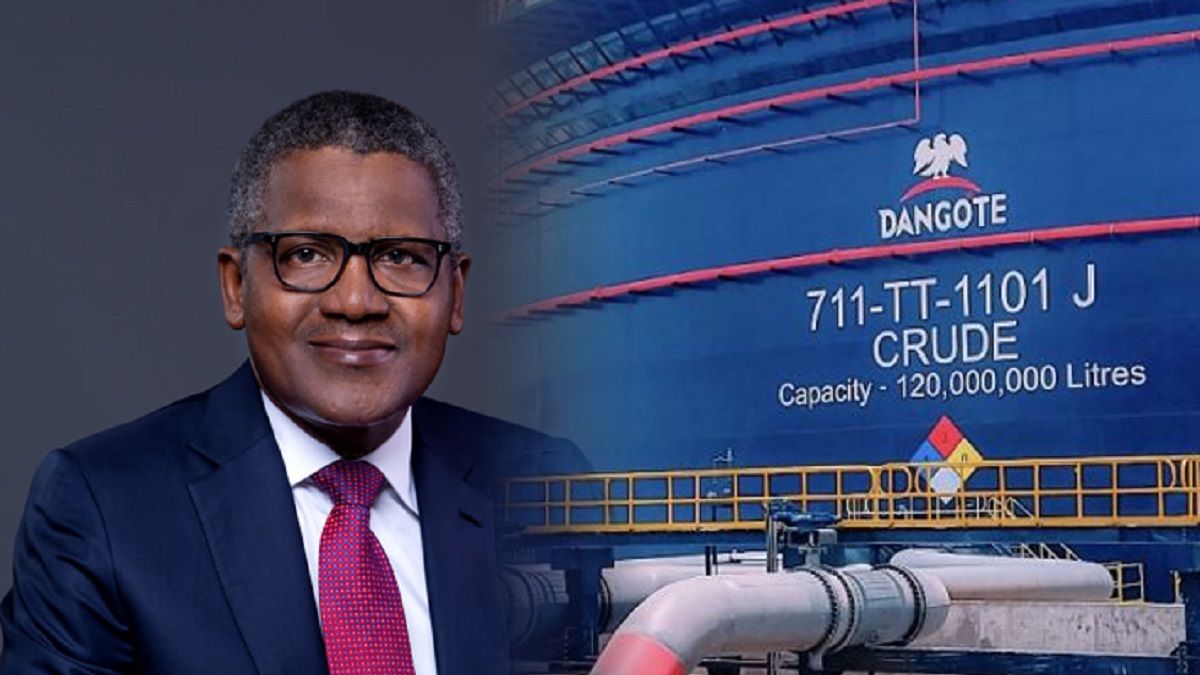
• PENGASSAN directs member to cut off crude, gas supply
• Directive is economic sabotage, says Dr. Yusuf of CPPE
• You lack legal right to intervene in supply contracts, says Refinery
After a celebrated feat of eradication of fuel scarcity in the country in the last two years, the queues may be back anytime soon except the federal government makes a quick intervention. Yesterday, the Petroleum and Natural Gas Senior Staff Association of Nigeria (PENGASSAN) ordered its seven branches to cut off crude oil and gas supplies to the $20 billion, 650,000 barrels per day Dangote Refinery and Petrochemical facility located in Ibeju-Lekki, Lagos.
PENGASSAN’s directive was in response to the Dangote Refinery’s sacking of about 800 Nigerian workers. While the Refinery’s management explained the sack exercise as “part of an ongoing reorganisation to protect the facility from repeated acts of sabotage that had raised safety concerns and hampered operations,” the organized labour said it is an “act of anti-labour practices.”
In a letter dated September 26 and signed by its General Secretary, Lumumba Okugbawa, the union accused the refinery’s management of sacking its members in retaliation for exercising their constitutional right to join the union.
In a memo signed by the General Secretary of PENGASSAN, Comrade Lumumba Okugbawa, and issued to Branch chairmen in TotalEnergies, Renaissances, Chevron, Shell Nigeria Gas, Oando and Seplat Producing Nigeria Unlimited, the union directed the immediate shutdown of all valves and suspension of all crude loading operations to the Dangote Refinery facility.
“As you are aware, the Management of Dangote Petroleum Refinery has disengaged our members in reaction to the exercise of their constitutional right to be unionised.
“They have gone further on a mission of misinformation and propaganda to justify this illegitimacy rather than engaging meaningfully with us to right the wrong.
“Consequent to these, you are hereby directed to cut off gas supply to NGIC effective immediately. All crude oil supply valves to the Refinery should be shut. The loading operation for the vessel headed there should be halted immediately,” the directive read.
The union further mandated the NGIC Chairman to ensure strict compliance with the order and told all branch chairmen to give regular updates on the action taken.
“NGIC Chairman, ensure that gas supply to the Refinery is cut off effective immediately. All chairmen on this summons are to report promptly the progress of the directive. Kindly accept the assurances of our highest esteem. Thank you,” the statement read. The union also threatened to picket the refinery if the situation was not addressed.
Dangote Refinery however warned that the directive by PENGASSAN to cut crude oil and gas supplies to the refinery could plunge Nigerians into fresh rounds of fuel scarcity while inflicting huge revenue losses on the government.
In a statement released by the firm yesterday, the refinery described the directive as “criminal, reckless and an act of economic sabotage” that, if enforced, would disrupt the production and nationwide supply of critical petroleum products, including petrol, diesel, aviation fuel, kerosene, and cooking gas.
The company stressed that these products are indispensable to daily life and the economy, warning that Nigerians at every level, from households to businesses and industries would bear the brunt of shortages. It noted that a sudden disruption in supply will translate into insufferable hardship for millions of Nigerians.
“The products that would be disrupted and stopped include but are not limited to aviation fuel, petrol, kerosene, diesel and cooking gas – all products that are used and required by all stripes of Nigerians and persons living in Nigeria, whether high and mighty or lowly and ordinary. In what circumstance would it be justified for PENGASSAN to so disrupt and introduce insufferable hardship into the living conditions of Nigerians? None that we can see.
“The follow up question is, in whose interest and on whose behalf is PENGASSAN directing and intending to inflict such anarchic and criminal disruption upon the Nigerian society and persons living in Nigeria? Most certainly, not in the interest of the Nigerian State and/or the Nigerian public and citizens,” the company said.
Beyond the immediate hardship on citizens, Dangote Refinery warned that the government’s revenue would also be dented, given the refinery’s status as one of the country’s largest taxpayers and contributors to both federal and state coffers. The company said any pause in operations would stall contributions to the national purse and undermine investor confidence in Nigeria’s oil and gas sector.
The statement noted, “This is also economic sabotage against the Nigerian State at multiple levels. Dangote Refinery is the only refinery of its type in Africa and ordinarily should be the pride of all Nigerians as well as the governments of Nigeria. It should ordinarily have special protection and status and indeed qualifies as a strategic national asset”.
It added that an irreparable injury to the Dangote Refinery such as PENGASSAN has directed constitutes a national embarrassment to the country and a disincentive to external investors who ordinarily would have been encouraged by the success of Dangote Refinery to contemplate investing in Nigeria’s oil and gas sector or generally.
“PENGASSAN may also not be aware that Dangote Refinery is one of the largest contributors to the revenue purse of the Nigerian governments – both Federal and sub-nationals. That contribution is currently threatened by PENGASSAN and would of course be paused if and as soon as and for as long as the PENGASSAN directive is implemented by its branches,” it noted.
The statement also noted that PENGASSAN had no legal authority to interfere in supply contracts between the refinery and its vendors, insisting that the action undermined the rule of law.
“Absolutely no law gives PENGASSAN the right to direct its branches to “cut off” gas and crude oil supplies to Dangote Refinery at all. There is also no law in our statute books that would support or enable the PENGASSAN branches having to “cut off” gas and crude oil supplies to Dangote Refinery at all. Besides, it constitutes a criminal conduct for PENGASSAN or its members to disrupt and/or interfere howsoever in the contract between Dangote Refinery and its various vendors for the supply of gas and crude oil to the Refinery. Those supply contracts were not entered into with PENGASSAN; they were entered into by Dangote Refinery with third party vendors and suppliers and PENGASSAN has no right whatsoever to disrupt and/or interfere with the performance of those contracts.”
Calling on the Federal Government and security agencies to act swiftly, the refinery urged Nigerians to take note of the “unquantifiable and irredeemable hardship which PENGASSAN wishes to inflict on all of us” if not checked, warning that fuel queues, energy shortages and price hikes could quickly resurface.
It urged PENGASSAN to submit to amicable and legal resolution and not resort to economic sabotage and mob action that could introduce mayhem and chaos and easily translate into anarchy.
Stakeholders are worried over the development, warning of its dire consequences on the country’s economy. For instance, Dangote Refinery, it is believed, has been the stabilizing factor in premium motor spirit (PMS) or petrol supply and steady availability in the country.
Presently, on daily basis, the refinery produces lighter products of 104 million litres- 57 million litres of petrol; 20 million litres of jet fuel and 27 million litres of diesel. 44 per cent of these volume can meet the entire requirements of Nigeria while 56 per cent of the production are exported. This production capacity is sufficient to meet 100 per cent of Nigeria’s local demand for refined petroleum products. The facility, according to Aliko Dangote, had exported 1.1 litres of petrol in the last three months. Nigeria’s daily petrol consumption is put at between 46 million litres and 50 million litres.
But notwithstanding the refinery’s capacity to meet local demands, Nigeria’s fuel import reliance rose to 71 per cent of total petrol consumed domestically in the month of May and June, 2025. The remaining 28.62 per cent was sourced from the Dangote Petroleum Refinery. By implication, marketers, who should access products locally are instead spending foreign exchange to import refined petroleum products.
This was contained in data released by the Nigerian Midstream and Downstream Petroleum Regulatory Authority (NMDPRA) in its July report presented to Federation Account Allocation Committee (FAAC). NMDPRA is the downstream regulator of the oil sector.
The report further gave a breakdown which indicated that in the period, the petrol consumed amounted to total of 1.478billion litres. Of this total, only 455,188,512 litres was sourced from local refineries, leaving 1.023,128,233 to importation. The 1.478 billion litres of petrol consumed in June was a 16.42 per cent decrease from 1.768 billion litres supplied in May.
The report also indicated that the average daily petrol supply for the month was 49.277 million litres, of which 34.104 million litres was imported and 15.172 million sourced from local refineries.
The total Automotive Gas Oil (diesel) consumed for the month was 432,180, 605 litres. This is 1.73 percent higher than 424,829, 199 consumed in the month of May. Of the total 432,180, 605 litres consumed in June, 378,130,852 was imported while 58,049,753 was from local refineries. Similarly, the average daily supply was 14,406,020 litres, of which 12,604,372 was imported and 1,801, 658 was locally sourced.
But stakeholders still maintained that notwithstanding these figures, PENGASSAN’s directive to shut gas and crude supply to Dangote refinery would still have a telling effect on the economy and by extension motorists. Besides, they cautioned that the unions may be over reaching with their actions.
The Chief Executive Officer, Center for the Promotion of Private Enterprise (CPPE), Dr. Muda Yusuf, said the idea of going to cut off gas supply, coal supply to Dangote is a disproportionate response to this particular development.
“We are talking here about issues of energy security. We are also talking about what exactly is in consonance with labour laws. If there are issues with an employer, I think there are processes to go about it. There are processes of resolving disputes. You have industrial courts, you have other processes. This particular step, for me, is going to the extreme.
“I don’t think that is the way to go. In all of these issues, you never can tell what the motive is because most of these people, including the unions, these are people who have been major beneficiaries of the importation regime. The coming into the industry of Dangote Refinery normally has created a lot of disruption and those who are benefiting from the status quo, including even some of these unions, are not likely to be happy with it.
“But what is more important in all of this is to ensure that due process is followed even by the unions. I don’t think the next thing to do is to go and be shutting gas pipeline or crude supply. This will also impact on contractual obligations between Dangote and the suppliers of these inputs. I don’t think they (PENGASSAN) need to go as far as that. I think there are better ways of resolving these disputes without creating a energy crisis for the country,” Dr. Yusuf said.
Although he agreed the suppliers can claim force majeure in the event that Dangote decides to take action against them for not supplying him the raw materials as agreed, Yusuf however said the Unions may have even committed an act of illegality.
“They may have committed an act of illegality by going as far as that. It is a disproportionate response from the union to Dangote. I’m not saying they cannot engage in a dispute but to go as far as that is disproportionate. It’s going to the extreme. Because if the company gets force majeure, losses must have been suffered on both sides. This is clearly a disruption inflicted by the union deliberately. So I’m not even sure whether that can qualify as force majeure. It can qualify as sabotage. That is what it’s going to look like,” Yusuf warned, adding that “there is need to interrogate the legality of even what they are doing because there are rules guiding labour actions. There are rules guiding the way you can also express your grievances, even as a union. I’m not sure that this particular step is covered in terms of what is legally permissible. You know, on that, you know, I doubt it and if it is found to be illegal, then there have to be consequences. We need to send a signal that nobody is above the law. I mean, you have the Ministry of Labour, you have the industrial courts. That is why they are there to resolve labour disputes. Of course, there is a major risk of disruption to petrol and fuel supply to the country because Dangote refinery is a major supplier of petrol and fuel. It’s a major supplier; it will disrupt the flow of supply of petrol and fuel and that will not be good for the country,” Dr. Yusuf, an economist, concluded.
Meanwhile, Dangote Refinery late yesterday has resumed which it announced its suspension on Friday.
The Chief Branding and Communications Officer, Dangote Group, Tony Chiejina, in a message to The Trust News.com, said the resumption followed the intervention of the Naira for Crude Technical Committee chairman.
The resumption of the sales in naira was contained in an email to its customers sighted by The Trust News.com yesterday night. The notice, signed by the Group Commercial Operations of Dangote Petroleum Refinery and Petrochemicals, was titled ‘Resumption of DPRP PMS Naira Sales”, read: “Following the intervention of the Naira for Crude Technical Committee chairman, we are pleased to inform you of the resumption of the supply of PMS sales in naira commencing immediately. You may kindly proceed to place your orders in naira for both self collection and free delivery of PMS to the earlier advised locations across the country.”
Energy
NMDPRA’s Farouk Ahmed, NUPRC’s Komolafe resign

- President Tinubu nominates successors
THE embattled Chief Executive of the Nigerian Midstream and Downstream Petroleum Regulatory Authority NMDPRA Engr. Farouk Ahmed and his counterpart in the Nigerian Upstream Petroleum Regulatory Commission, NUPRC, Gbenga Komolafe, have resigned.
Already, President Bola Tinubu has asked the Senate to approve the nominations of two new chief executives for the NMDPRA and the NUPRC.
A statement by the presidential spokesman, Bayo Onanuga, explained that the President’s requests followed the resignation of the duo.
Both officials were appointed in 2021 by former President Buhari to lead the two regulatory agencies created by the Petroleum Industry Act (PIA).
To fill these positions, President Tinubu has written to the Senate, requesting expedited confirmation of Oritsemeyiwa Amanorisewo Eyesan as CEO of NUPRC and Engineer Saidu Aliyu Mohammed as CEO of NMDPRA.
The two nominees are seasoned professionals in the oil and gas industry.
Eyesan, a graduate of Economics from the University of Benin, spent nearly 33 years with the NNPC and its subsidiaries. She retired as Executive Vice President, Upstream (2023–2024), and previously served as Group General Manager, Corporate Planning and Strategy at NNPC from 2019 to 2023.
Engineer Saidu Aliyu Mohammed, born in 1957 in Gombe, graduated from Ahmadu Bello University in 1981 with a Bachelor’s in Chemical Engineering. He was announced today as an independent non-executive director at Seplat Energy.
His prior roles include Managing Director of Kaduna Refining and Petrochemical Company and Nigerian Gas Company, as well as Chair of the boards of West African Gas Pipeline Company, Nigeria LNG subsidiaries and NNPC Retail.
He also served as Group Executive Director/Chief Operating Officer, Gas & Power Directorate, where he provided strategic leadership for major gas projects and policy frameworks, including the Gas Masterplan, Gas Network Code, and contributions to the Petroleum Industry Act (PIA).
Engineer Mohammed played a pivotal role in delivering key projects such as the Escravos–Lagos Pipeline Expansion, the Ajaokuta–Kaduna–Kano (AKK) Gas Pipeline, and Nigeria LNG Train.

- Above advert placement contains allegations against the erstwhile NMDPRA Chief Executive, Farouk Ahmed
Recall that on Monday, the Dangote Refinery and Petrochemicals accused the NMDPRA led by Farouk Ahmed of undermining its refinery.
The President, Dangote Group, Aliko Dangote, also accused the regulating agency of economic sabotage and urged the government to probe its activities and also probe NMDPRA Chief Executive Officer (CEO), Farouk Ahmed.
He accused NMDPRA leadership of colluding with international traders and oil importers to frustrate local refining through the continued issuance of import licences for petroleum products.
Alleging that Ahmed had been living above his means, Dangote said the bills being picked by the NMDPRA boss raised serious questions about potential conflicts of interest and the integrity of regulatory oversight in the downstream petroleum sector.
Dangote said: “I am not calling for his removal, but for a proper investigation. He should be required to account for his actions and demonstrate that he has not compromised his position to the detriment of Nigerians. What is happening amounts to economic sabotage.”
The business mogul said: “The Code of Conduct Bureau (CCB), or any other body deemed appropriate by the government, can investigate him.
Energy
Dangote alleges sleaze in NMDPRA
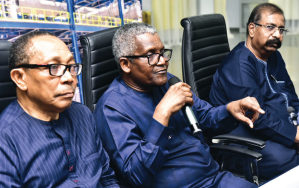
• Industrialist seeks probe of agency
• Petrol to sell for N740 from tomorrow
Dangote Refinery and Petrochemicals yesterday accused the regulating agency of downstream sector of undermining its refinery.
He accused Nigerian Midstream and Downstream Petroleum Regulatory Authority (NMDPRA) of economic sabotage and urged the government to probe its activities.
President of the Dangote Refinery, Alhaji Aliko Dangote, who spoke in Lagos yesterday at a news conference urged the government to also probe NMDPRA Chief Executive Officer (CEO), Farouk Ahmed.
He accused NMDPRA leadership of colluding with international traders and oil importers to frustrate local refining through the continued issuance of import licences for petroleum products.
Alleging that Ahmed had been living above his means, Dangote said the bills being picked by the NMDPRA boss raised serious questions about potential conflicts of interest and the integrity of regulatory oversight in the downstream petroleum sector.
He assured of further fall in the pump price of petrol. He said the product would sell at no more than N740 per litre from tomorrow in Lagos, because of his refinery’s reduction of gantry price to N699 per litre.
He said MRS filling stations would be the first to reflect the new pricing.
Expressing concern over the state of the downstream sector, Dangote said Nigeria’s continued reliance on fuel imports was harming local production and discouraging investment in domestic refining.
He said import licences covering approximately 7.5 billion litres of PMS had reportedly been issued for the first quarter of 2026, despite the availability of significant domestic refining capacity.
According to him, modular refineries are already struggling under the current policy environment and on the brink of extinction, while the persistent issuance of import permits further weakens the sector.
Dangote said: “I am not calling for his removal, but for a proper investigation. He should be required to account for his actions and demonstrate that he has not compromised his position to the detriment of Nigerians. What is happening amounts to economic sabotage.”
The business mogul said: “The Code of Conduct Bureau (CCB), or any other body deemed appropriate by the government, can investigate him.
He described the downstream petroleum sector as being under severe strain, alleging the presence of entrenched interests that profit from fuel imports at the expense of national development.
“There are powerful interests in the oil sector. It is troubling that African countries continue to import refined products despite long-standing calls for value addition and domestic refining. The volume of imports being allowed into the country is unethical and does a disservice to Nigeria,” he added.
Dangote stressed the need for a clear separation between regulatory oversight and commercial interests, warning that allowing traders to influence regulation would undermine the integrity of the sector.
“The downstream sector must not be destroyed by personal interests. A trader should never be a regulator. Forty-seven licences have been issued, yet no new refineries are being built because the environment is not conducive,” he said.
He maintained that Nigerians would ultimately benefit from local refining, fuel importers incur losses. Dangote said he would not relent in ensuring that Nigerians enjoy the benefits of domestic refining, noting that the company was working around the clock to ensure that recent reductions in the gantry price were fully reflected at the retail level.
“From Tuesday (tomorrow)”, he said, “all MRS filling stations would begin selling PMS at prices not exceeding N740 per litre, starting in Lagos.”
He added that the refinery had reduced its minimum purchase requirement from two million litres to 500,000 litres to enable more marketers, including members of the Independent Petroleum Marketers Association of Nigeria (IPMAN), to participate.
“So, if you come to the refinery today, you will get PMS at N699 per litre,” he said.
Dangote explained that despite frustration and sabotage, the refinery would deploy its Compressed Natural Gas (CNG) trucks in the coming days and was prepared to procure additional units beyond the initial 4,000 if required to sustain affordable pricing nationwide.
Responding to complaints from oil importers that the recent price reduction would result in losses, Dangote said the refinery was established primarily for the benefit of Nigerians.
“Anyone who chooses to continue importing despite the availability of locally refined products should be prepared to face the consequences,” he said.
He also highlighted quality differences, noting that products supplied through MRS and other off-takers from the refinery were straight-run fuels, unlike blended products imported from overseas markets.
“Nigerians have a choice to buy better quality fuel at a more affordable price or to buy blended PMS at a higher rate. Importers can continue to lose, so long as Nigerians benefit,” he added.
Dangote said the refinery was driven more by legacy than profit, noting that he could have invested the 20 billion dollars elsewhere if financial gain were his sole objective.
He reaffirmed the plan to list the refinery on the Nigerian Exchange to allow Nigerians to own shares in the facility.
“We want every living Nigerian to have the opportunity to benefit, no matter how small their holding. If the market takes 55 per cent and I retain 45 per cent, I am satisfied,” he said.
Dangote explained that discussions were ongoing with the Securities and Exchange Commission (SEC) to enable Nigerians to purchase shares in naira while receiving dividends in dollars.
Dangote accused the NMDPRA of misrepresenting the refinery’s capacity by publishing off-take figures rather than actual production levels.
“We have the capacity to meet local demand, and we have sufficient refined products in stock. But to keep prices high, imports are deliberately encouraged,” he said, adding that attempts were being made to push the refinery into exporting products only for them to be re-imported into Nigeria at higher prices.
“This refinery is for Nigerians first, and I am not giving up,” he said.
Dangote also explained that the refinery imports an average of 100 million barrels of crude oil annually from the United States, a figure expected to rise to 200 million barrels following expansion, due to insufficient domestic crude supply.
He added that the refinery also sources crude from Ghana and other countries, while exporting jet fuel and gasoline to the United States (U.S.).
Dangote further alleged that domestic refiners are forced to buy Nigerian crude at premiums of up to four dollars per barrel from the trading arms of international oil companies, placing them at a competitive disadvantage.
He called on the government to ensure crude oil taxes are assessed based on actual transaction values, warning that the current system allows under-declaration and revenue losses.
Energy
NNPC E&P Limited Hits Record 355,000 bpd Production
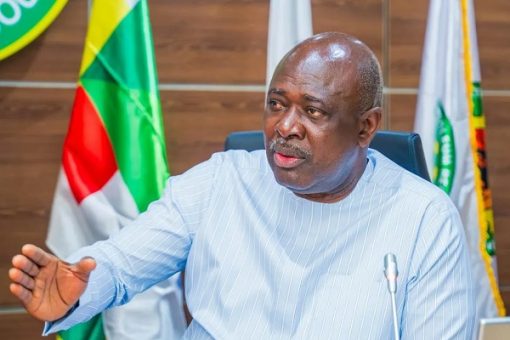
• Nigeria’s Energy Revival Already Happening, Says Ojulari
On December 1st, 2025, NNPC E&P Limited (NEPL), the flagship upstream subsidiary of NNPC Limited, achieved a record production level of 355,000 barrels of oil per day, its highest daily output since 1989.
The milestone marks a significant step forward for Nigeria’s upstream sector and reflects the company’s ongoing transformation anchored on efficiency and discipline.
The figures show genuine transformation: average daily production surged 52%, rising from 203,000 barrels per day in 2023 to 312,000 in 2025.
This growth is no coincidence; it stems from a clear strategy anchored on operational excellence, strong asset management, and structured field development. NEPL’s performance demonstrates that with the right leadership, strengthened systems, and a committed workforce, Nigeria’s upstream sector can overcome years of instability.
The achievement converts national ambition into measurable momentum. The presidential targets of 2 million barrels per day by 2027 and 3 million by 2030 have often appeared aspirational. NEPL’s delivery brings them closer to reality.
Speaking on the development, Engr. Bashir Bayo Ojulari, the Group CEO of NNPC Limited pointed out that the milestone is proof that Nigeria’s energy revival is not a dream; it is already happening.
“By showing its ability to exceed its own production benchmarks, NEPL confirms that the essential building blocks for scaling national output are being firmly established. The achievement signals that the machinery of production—equipment, processes, capabilities, and partnerships—can be driven with commercial discipline to produce real and positive outcomes,” Ojulari stated.
He noted that the achievement reinforces confidence nationally and across the global energy landscape, assuring partners and investors that Nigeria is committed to reaffirming its role as a dependable energy supplier.
Also speaking, Udy Ntia, the Executive Vice President, Upstream, observed that the milestone goes beyond the 355,000 bpd figure.
“In a sector where shortcuts can yield short-term wins but long-term damage, NEPL is making a different point: sustainable progress must rest on responsible operations. This ensures that scaling production does not compromise worker safety, community wellbeing, or environmental protection. It reinforces a shift away from extraction at any cost towards sustainable value creation—a core requirement for any modern energy company seeking global relevance,” Ntia added.
Nicolas Foucart, MD, NEPL also noted that NEPL’s record-setting performance mirrors the broader transformation unfolding across NNPC Limited.
“This is a story shaped by leadership that charts a clear course; by partnerships built on alignment and accountability; and by a workforce whose hard work is turning goals into measurable progress. Our people, our processes, and principles are the real engines behind this success. We are building for tomorrow, not just celebrating today,” Foucart stated.
He added: “For Nigerians, this accomplishment means far more than increased barrels; it translates into greater national revenue, stronger energy security, and a more resilient economic foundation. NEPL has not only produced more hydrocarbons; it has reignited belief in what Nigeria’s energy sector can achieve with the right systems, culture, and dedication.”
NNPC E&P Limited is a wholly-owned subsidiary of the Nigerian National Petroleum Company (NNPC) Limited involved in the exploration and production of oil and gas resources.
-

 Art & Life9 years ago
Art & Life9 years agoThese ’90s fashion trends are making a comeback in 2017
-

 Entertainment9 years ago
Entertainment9 years agoThe final 6 ‘Game of Thrones’ episodes might feel like a full season
-

 Business9 years ago
Business9 years agoThe 9 worst mistakes you can ever make at work
-

 Art & Life9 years ago
Art & Life9 years agoAccording to Dior Couture, this taboo fashion accessory is back
-

 Entertainment9 years ago
Entertainment9 years agoThe old and New Edition cast comes together to perform
-

 Sports9 years ago
Sports9 years agoPhillies’ Aaron Altherr makes mind-boggling barehanded play
-

 Entertainment9 years ago
Entertainment9 years agoMod turns ‘Counter-Strike’ into a ‘Tekken’ clone with fighting chickens
-

 Entertainment9 years ago
Entertainment9 years agoDisney’s live-action Aladdin finally finds its stars


